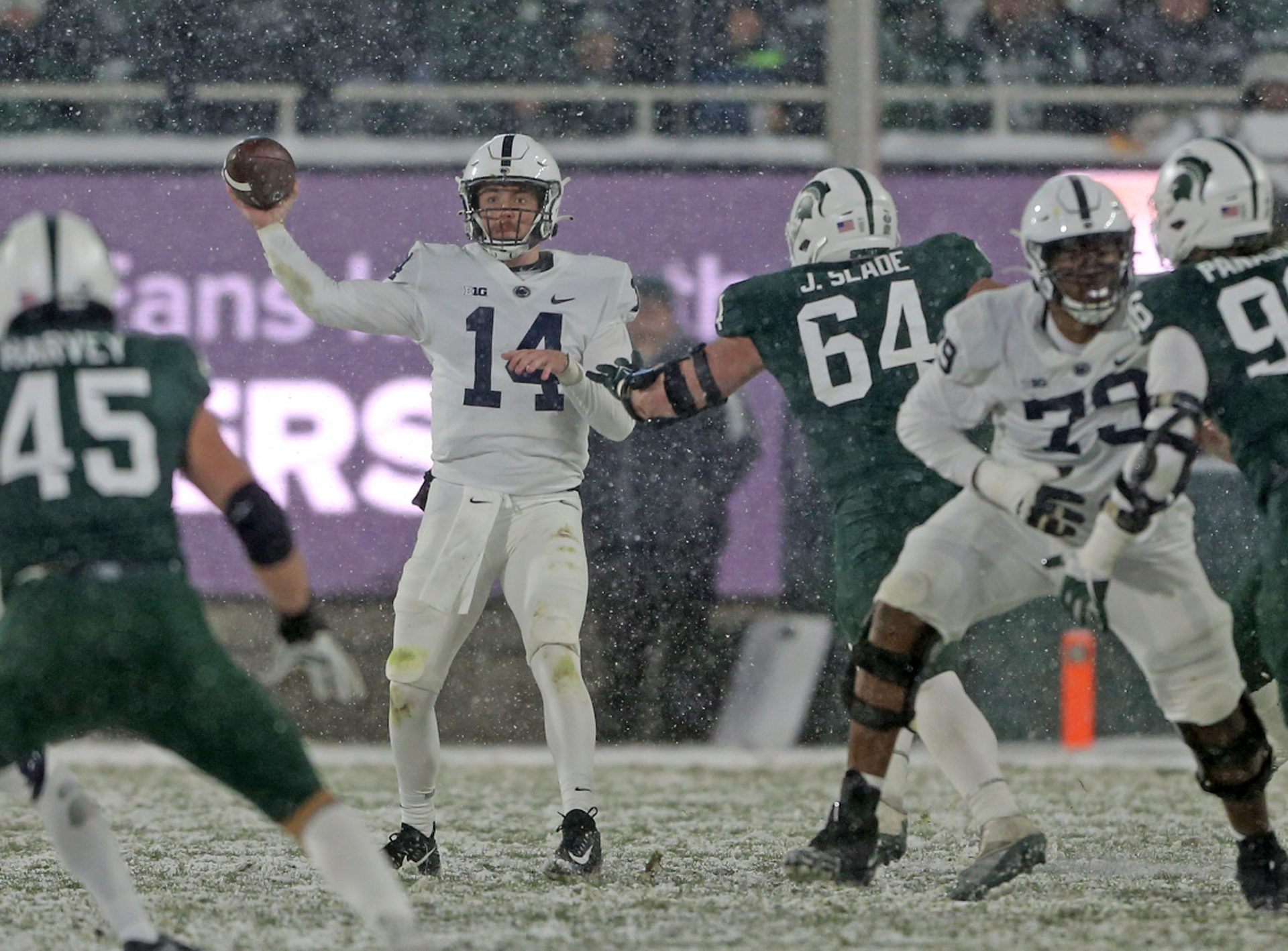EAST LANSING, Mich. — The margins are small. Whatever your qualms might be about Penn State’s year or the general trajectory of the past two (or more) seasons. it would be unfair to say the Nittany Lions are wildly off track in the realm of being competitive at the level they would like to be. They might not be as good as you would like, but they’re not far from it. Contrary to popular belief, no, they aren’t bad.
Illinois: 20-18, a bad loss, but nine overtimes with a half-functioning Sean Clifford. It happens.
Ohio State: 33-24 in one of Penn State’s best-ever 60-minute performances in Columbus.
Michigan, 21-17 in a game the Nittany Lions very well could have, and perhaps should have won.
Michigan State, 30-27, a snowy loss that could have just as easily been a win.
Iowa: 23-20, most everyone loses when their starting quarterback is hurt.
The question isn’t why it happens, or if it should. In fact, with 130 teams in college football there are a lot of programs trying to be as good as Penn State. For Penn State, in the grand scheme of things against the likes of Michigan and Ohio State, it’s a question of erasing very, very small margins.
But how do you do that? It’s one thing to write down goals and problems; the Nittany Lions aren’t unable to understand their shortcomings. The challenge isn’t self awareness. It’s making change actionable.
So why is that so hard? What is the obstacle between knowing your issues and changing them?
“Honestly, discipline,” receiver Jahan Dotson said on Saturday. “You go into every day in practice, you can’t take a rep for granted. I pride myself on that this year, doing my job and catching the football. Making sure that I’m in the right place at the right time. I just pride myself on the little things. It has brought me a pretty long way so far.”
Much like his predecessor DaeSean Hamilton, Dotson is this message personified. He has gone from a hopeful depth player years ago to one of the best wide receivers in the nation and a near first-round lock in the upcoming NFL Draft. It didn’t happen by mistake, it happened because Dotson made it happen.
The same could be said for quarterback Sean Clifford. Whatever his overarching shortcomings might be, Clifford has been miles better this year than he was in 2020. Penn State’s third-year starter might have been a dealt a difficult hand with a multiple offensive coordinators and a COVID season under his belt, but Clifford is a better quarterback today than he was three years ago.
And that doesn’t happen by mistake. It happens because of improvement. Some of that is talent, some of it is approach.
“I think it’s the little things, the day by day,” Clifford said. “Not just saying ‘OK, I want to get better at over the middle throws.’ It’s then going out and consistently every practice having an intention of OK, I need to be super accurate on these throws specifically, you know, and I have an enhanced focus on the little things of whatever you’re trying to get better at. It’s cliche to say it’s focus on things, but the same time you going into meetings and I’ll write it down at the top of my notebook like I’m trying to get 1% better at this today. I’ve had that mentality for 365 days, and some of them are definitely paying off.”
That’s not to say Penn State’s season is simply a matter of guys not trying hard enough. The Nittany Lions have seen too many ups — and, frankly, downs — to write off everything as a matter of effort. But in a world defined by the smallest of margins, all of those little things matter. Every rep matters, every film session matters, every practice matters.
And when it doesn’t quite happen, especially with a team with plenty of flaws, everything is magnified.
“It’s kind of hard to answer,” running back Keyvonne Lee said of improving. “But I know that we should be up to the level. It’s kind of sad when you’re not playing like we should be or executing the plays that we should execute. It’s little details and little things that come and bite us.”
So in the big picture, it might be the smallest details that matter the most.
As someone once said, it’s taking care of the little things, so the big things take care of themselves.



